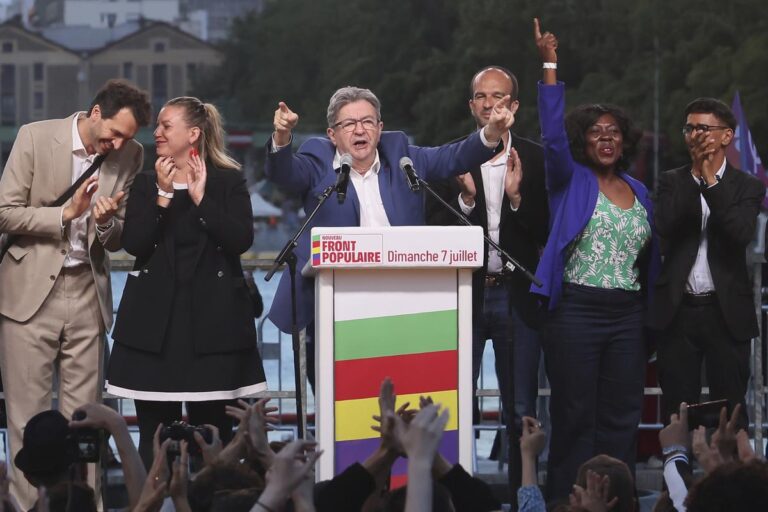France’s political parties were trying to project strength and rally allies as the government was left in a state of flux following a July 9 election in which no party won a clear majority.
New members of the left-wing New Popular Front (NFP) coalition, which unexpectedly came out on top in opinion polls, have begun visiting their new offices in parliament ahead of the first session on July 18.
But the coalition government of the Greens, Socialists, Communists and far-left Indomitable France (LFI) is still debating who to nominate as the next prime minister and the possibility of forming a broader coalition government.
Together, left-leaning parties hold 193 of the 577 seats in parliament, far short of the 289 needed for a majority.
Nevertheless, LFI executive director Mathilde Panot said her members planned to nominate the next prime minister “by the end of this week”.
In the French system, the president nominates the prime minister, who must then pass a vote of confidence in parliament — a difficult task with three closely-knit political factions.
READ ALSO | French President Emmanuel Macron seeks to reshape the political landscape, but no clear path to forming a new government remains
A left-wing government would need “broader support in the National Assembly,” influential Socialist lawmaker Boris Vallot acknowledged in an interview with France Inter radio.
Macron’s team came second in Sunday’s vote, winning 164 seats after voters rallied to thwart the far-right Rally National (RN) party from governing.
This puts the anti-immigration, anti-Brussels party in third place with 143 members.
For now, the president is keeping Prime Minister Gabriel Attal in power, hoping that the maneuvering in the coming days and weeks will provide an opportunity to regain control.
But “there has been an institutional change. Everyone thinks it is up to the newly elected National Assembly to come up with solutions, which (Macron) will have to accept,” wrote Guillaume Tabar, a commentator for the conservative daily Le Figaro.
“No one can rule alone”
In a sign of remaining differences, lawmakers from left-leaning parties were scheduled to enter parliament at different times throughout the day.
The Socialist Party hopes to attract a few more members to outnumber the LFI and have a bigger say in the direction of the alliance.
Meanwhile, members of Macron’s camp had been eyeing the centre-left Socialist Party and the conservative Republicans as convenient allies in a new centrist coalition government.
“None of the three main forces can govern alone,” Stephane Séjourne, leader of Macron’s Renaissance party, wrote in the daily Le Monde.
“The centrists are ready to negotiate with all members of the republican bloc,” he added, pointing to red lines that coalition members must support the EU and Ukraine and maintain business-friendly policies.
These requirements, he warned, “will inevitably exclude LFI and its outspoken founder Jean-Luc Mélenchon.”
Markets are keeping their eye on the EU’s second-largest economy.
Ratings agency Moody’s warned it could downgrade the credit rating of France’s more than 3 trillion euros of debt if a future government reverses President Macron’s widely disliked 2023 pension reforms, reiterating a warning from S&P on Monday about the budget deficit.
What next?
As politicians struggle to chart a course forward, attention is also focused on when French voters will next go to the polls.
Macron’s term ends in 2027 and he cannot run a third time, potentially paving the way for his twice-defeated opponent and RN figurehead Marine Le Pen to ultimately take the presidency.
The far-right party is suffering a disappointing result after opinion polls suggested it could win an absolute majority in parliament.
On Tuesday, party officials AFP Its executive director, Jill Pennell, has resigned.
Mr Pennell, who was elected to the European Parliament last month, was the architect of a “push-button” plan to prepare the RN for early elections but ultimately was unable to line up a credible candidate.
The rise of far-right parties is undeniable, having grown from just eight members of parliament after Macron’s first presidential victory in 2017 to 143 today.
Opinion | The resurgence of the left: French elections and European politics
Nevertheless, leaders of the Green Party and LFI called on Tuesday for the RN to be barred from key parliamentary posts.
“Every time you give them a job, their capabilities improve. It’s important not to give them jobs with too much responsibility,” said Mathilde Panot, a leading LFI lawmaker.
“Today we have 143 deputies representing 10 million French people,” RN leader Thomas Menage fired back, calling the allegations “anti-democratic”.
Macron, meanwhile, has sought to stay out of the fray and is due to visit Washington for a NATO summit that starts on Wednesday, where allies may need French assurances of stability.
This is a premium article available only to our subscribers. To read over 250 premium articles every month,
You’ve reached your limit for free articles. Support quality journalism.
You’ve reached your limit for free articles. Support quality journalism.
You have read {{data.cm.views}} from {{data.cm.maxViews}} Free articles.
This is the last free article.

